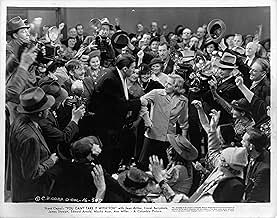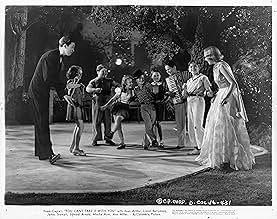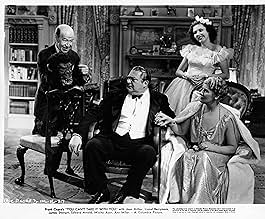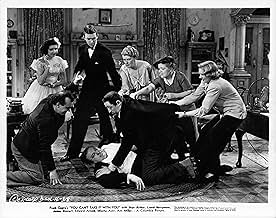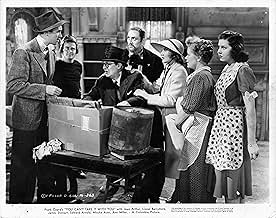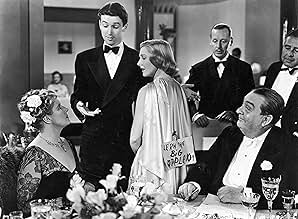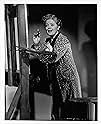AVALIAÇÃO DA IMDb
7,8/10
30 mil
SUA AVALIAÇÃO
Um homem de uma família rica se compromete com uma mulher de uma família atenciosa, mas decididamente excêntrica.Um homem de uma família rica se compromete com uma mulher de uma família atenciosa, mas decididamente excêntrica.Um homem de uma família rica se compromete com uma mulher de uma família atenciosa, mas decididamente excêntrica.
- Direção
- Roteiristas
- Artistas
- Ganhou 2 Oscars
- 6 vitórias e 7 indicações no total
Eddie 'Rochester' Anderson
- Donald
- (as Eddie Anderson)
- Direção
- Roteiristas
- Elenco e equipe completos
- Produção, bilheteria e muito mais no IMDbPro
Avaliações em destaque
My favorite american director is Frank Capra."It Happened One Night" is his first great film."Mr.Deeds Goes To Town","Mr.Smith Goes To Washington" and "Meet John Doe" are perfect examples of how to make a great film about simple,ordinary man."It's A Wonderful Life" is everybody's favorite holiday film.But "You Can't Take It With You" is Capra's masterpiece.The story is perfect,The direction is brilliant and it's impossible you don't get tears in your eyes with the sweetness and shear simplicity of Martin Vanderhof.That leads us to the best thing in this classic:Lionel Barrymore,one of the greatests actors in film history.All you have to do is see this film and "It's a Wonderful Life" and see for yourselfs.Mr.Potter is cruel,heartless,despicable and absolute fascinating(I still can't believe it ranked only 6 in the AFI list,because for me he's the greatest villain in film history)All Mr.Potter lack,Martin Vanderhof has to share.He is absolutely adorable,he has a lot of friends.(The scene in the court room is magnificent)he is sweet,and equally fascinating.(Not to mention that Lionel is really gorgeous in this film)One must remember the shining presence of Jean Arthur,and equally portrayal of good and young Jimmy Stewart.Not to forget Edward Arnold and his greedy Anthony P. Kirby,who tries at all costs to buy Grandpa's house.But Lionel teaches him in a marvelous harmonica duet,how to enjoy life.The Plot is simply and delightul.Jean is Lionel's granddaughter,and she loves Jimmy Stewart,who is the son of the blood sucking banker Arnold.Jean decided that the two family's shall met,But Stewart's family will have a shock when they meet the wonderful and very eccentric Vanderhof family with Lionel,the grandfather anyone would love to have,Spring Byington as the writing mother(Only because someone forgot a typing writer in her house)Ann Miller as the adorable dancing sister,Essie,and a very funny Mischa Auer as the russian dancing teacher,who always arrives just in time for dinner.Pay also attencion in a small but memorable perfomance of the forgotten silent actor H.B.Warner as the broken Mr.Ramsey.I believe I already say to much,but not all this site will be enough to say what this masterpiece and Martin Vanderhof means to me
My Rate:1000 Out Of 10
My Rate:1000 Out Of 10
With many of the same themes, and indeed many of the same actors, 'You Can't Take It With You' can be considered a sister film to 'It's a Wonderful Life', though preceding it by eight years. It's a romantic comedy but also a study in class differences told at a fascinating point in history, with America still in the Great Depression, and with the world in tumult. A wealthy banker (Edward Arnold) seeks to monopolize the munitions industry prior to the world going to war, but needs to purchase the house owned by eccentrics led by a whimsical old man (Lionel Barrymore). In a convenient coincidence, the banker's son (Jimmy Stewart) is dating the old man's granddaughter (Jean Arthur), and the pair want to get married, so there are two conflicts here.
Barrymore is in the role of the good guy, the one who's figured out that material things are less important than having friends and enjoying life. He also understands that you've got to let people be free to explore themselves, and be who they are. He has a charming scene early on with Arthur, listening to her describe her new love, and reminiscing about his deceased wife. He's also the voice of reason about extremism in the world, commenting that everybody was running out to 'get an ism' to solve their problems, e.g. communism or fascism, as opposed to sticking to the principles of America. "With malice toward none and charity to all," he quotes Lincoln, "Nowadays they say think the way I do or I'll bomb the daylights out of you." It's a wonderful character, and well played by Barrymore.
Jimmy Stewart and Jean Arthur are endearing in their roles as well, and they also turn in very good performances. Watch Arthur's small facial reactions in the aforementioned scene with Barrymore, and later when she's with Stewart when he's clowning around in the restaurant and threatening to scream. The idea that the innovation Stewart's character wants to pursue harvesting energy from the sun's rays like plants really made me smile, seeing as this type of green energy sounded so crazy in 1938. The film isn't bullish on the idea per se, but it gets across the point that it's better to have the courage to follow one's dreams, than it is to bury them in a hum-drum existence.
There is a joy to the film in this house that Barrymore runs, with inventors in the basement letting off firecrackers, Jean Arthur sliding down the bannister, and her sister (Ann Miller) twirling around to her ballet instructor's direction. On the night Stewart decides to drop in on them as a surprise so that his family can see Arthur's in a true light, Miller is dancing about, Barrymore is tossing darts, his daughter (Spring Byington) is working on an awful old painting of hers with one of the guys posing as a Roman discus thrower, and the servants are dancing delightfully in the kitchen. Everyone is simply being themselves. No one cares how good they are, or exactly how they'll monetize what they're doing. They simply do what they want to do, and have fun at it, letting the money sort itself out in some mysterious way that isn't immediately apparent to us.
A lot is made of director Frank Capra's idealism, which may seem naïve to the modern viewer. It's true that this is movie of hope and optimism, but at the same time, Capra was clear-eyed about what was happening in the world. When Barrymore asks the Russian ballet teacher (Mischa Auer) "Did you bring me any Russian stamps?," the latter replies "No, nobody writes to me, they're all dead," which considering Stalin's purges in 1937-38 is a chilling comment slipped in to the script. Capra also recognized the danger of a climate of fear, and through Arthur's character (actually quoting Barrymore's), says that he has a special aversion to those "the people who commercialize on fear, to sell you something you don't need." He's also spot on when it comes to satirizing the ultra-wealthy, and pointing out how unfair the world is when the wealth gap is so large. Edward Arnold's character buys influence in Washington and has a squadron of lawyers and yes-men to help him push his weight around. On the personal side he turns up his nose at the idea of eating humble fare, and his wife (Mary Forbes) haughtily looks down on everyone. As he's about to explain to a bunch of guys in jail how unemployment is "an emotional problem", he tosses a cigar away and a horde of them go after it, which is such a perfect metaphor. Capra was a beacon in the darkness, and with his ability to deliver such stirring social messages in delightful movies - making them work on both levels - he should be considered a genius.
On the other hand, it's interesting that Barrymore's character has such a casual attitude about money, I mean, one does need to be able to eat. It's a little disturbing that when an IRS agent calls on him, he admits that he's never paid income tax because he "doesn't believe in it." He then goes on to ask where all those dollars go, ridiculing the idea that America needs battleships since they haven't been used since the Spanish-American War (hmmm not so prescient in that comment), and not seeing the irony in the fact that his own servants are "on relief." He'll later say that he was just joking about all this, that he doesn't owe the government a dime, but I just thought this smacked of such backwardness, and counter to all of the programs FDR started that were helping Americans. Later we find out that he was once an executive himself, until one day "it struck me that I wasn't having any fun." I admire the sentiment to prioritize life over amassing a fortune since, after all, you can't take it with you, but it seems a little tone deaf to not recognize the need for some amount of wealth to have this luxury.
There are lots of parallels to 'It's a Wonderful Life', including the rich industrialist who has lost his sense of values and is poor in the more important ways in life, the 'little guy' who resists his plans for a monopoly by not selling out to him, and a spontaneous cash collection from friends when one is in trouble. In addition the obvious actors in both films, you'll also find Papa Bailey (Samuel S. Hinds) here, as well as the same raven (Jimmy the raven), who apparently had quite the filmography and collaboration with Capra. In this case Stewart is the scion of the industrialist, not the little guy, and he ultimately quits his dad's company to pursue his own dream, as opposed to finding himself forced to stick around at the ol' Building and Loan. The biggest difference, however is that this film imagines that rich men have souls, and that there is a place deep within that can be reached through friendly overtures and some harmonica music. Perhaps recognizing this was idealistic even by his own standards, it's notable that eight years later, that wasn't the case with Mr. Potter, who was never reached.
Barrymore is in the role of the good guy, the one who's figured out that material things are less important than having friends and enjoying life. He also understands that you've got to let people be free to explore themselves, and be who they are. He has a charming scene early on with Arthur, listening to her describe her new love, and reminiscing about his deceased wife. He's also the voice of reason about extremism in the world, commenting that everybody was running out to 'get an ism' to solve their problems, e.g. communism or fascism, as opposed to sticking to the principles of America. "With malice toward none and charity to all," he quotes Lincoln, "Nowadays they say think the way I do or I'll bomb the daylights out of you." It's a wonderful character, and well played by Barrymore.
Jimmy Stewart and Jean Arthur are endearing in their roles as well, and they also turn in very good performances. Watch Arthur's small facial reactions in the aforementioned scene with Barrymore, and later when she's with Stewart when he's clowning around in the restaurant and threatening to scream. The idea that the innovation Stewart's character wants to pursue harvesting energy from the sun's rays like plants really made me smile, seeing as this type of green energy sounded so crazy in 1938. The film isn't bullish on the idea per se, but it gets across the point that it's better to have the courage to follow one's dreams, than it is to bury them in a hum-drum existence.
There is a joy to the film in this house that Barrymore runs, with inventors in the basement letting off firecrackers, Jean Arthur sliding down the bannister, and her sister (Ann Miller) twirling around to her ballet instructor's direction. On the night Stewart decides to drop in on them as a surprise so that his family can see Arthur's in a true light, Miller is dancing about, Barrymore is tossing darts, his daughter (Spring Byington) is working on an awful old painting of hers with one of the guys posing as a Roman discus thrower, and the servants are dancing delightfully in the kitchen. Everyone is simply being themselves. No one cares how good they are, or exactly how they'll monetize what they're doing. They simply do what they want to do, and have fun at it, letting the money sort itself out in some mysterious way that isn't immediately apparent to us.
A lot is made of director Frank Capra's idealism, which may seem naïve to the modern viewer. It's true that this is movie of hope and optimism, but at the same time, Capra was clear-eyed about what was happening in the world. When Barrymore asks the Russian ballet teacher (Mischa Auer) "Did you bring me any Russian stamps?," the latter replies "No, nobody writes to me, they're all dead," which considering Stalin's purges in 1937-38 is a chilling comment slipped in to the script. Capra also recognized the danger of a climate of fear, and through Arthur's character (actually quoting Barrymore's), says that he has a special aversion to those "the people who commercialize on fear, to sell you something you don't need." He's also spot on when it comes to satirizing the ultra-wealthy, and pointing out how unfair the world is when the wealth gap is so large. Edward Arnold's character buys influence in Washington and has a squadron of lawyers and yes-men to help him push his weight around. On the personal side he turns up his nose at the idea of eating humble fare, and his wife (Mary Forbes) haughtily looks down on everyone. As he's about to explain to a bunch of guys in jail how unemployment is "an emotional problem", he tosses a cigar away and a horde of them go after it, which is such a perfect metaphor. Capra was a beacon in the darkness, and with his ability to deliver such stirring social messages in delightful movies - making them work on both levels - he should be considered a genius.
On the other hand, it's interesting that Barrymore's character has such a casual attitude about money, I mean, one does need to be able to eat. It's a little disturbing that when an IRS agent calls on him, he admits that he's never paid income tax because he "doesn't believe in it." He then goes on to ask where all those dollars go, ridiculing the idea that America needs battleships since they haven't been used since the Spanish-American War (hmmm not so prescient in that comment), and not seeing the irony in the fact that his own servants are "on relief." He'll later say that he was just joking about all this, that he doesn't owe the government a dime, but I just thought this smacked of such backwardness, and counter to all of the programs FDR started that were helping Americans. Later we find out that he was once an executive himself, until one day "it struck me that I wasn't having any fun." I admire the sentiment to prioritize life over amassing a fortune since, after all, you can't take it with you, but it seems a little tone deaf to not recognize the need for some amount of wealth to have this luxury.
There are lots of parallels to 'It's a Wonderful Life', including the rich industrialist who has lost his sense of values and is poor in the more important ways in life, the 'little guy' who resists his plans for a monopoly by not selling out to him, and a spontaneous cash collection from friends when one is in trouble. In addition the obvious actors in both films, you'll also find Papa Bailey (Samuel S. Hinds) here, as well as the same raven (Jimmy the raven), who apparently had quite the filmography and collaboration with Capra. In this case Stewart is the scion of the industrialist, not the little guy, and he ultimately quits his dad's company to pursue his own dream, as opposed to finding himself forced to stick around at the ol' Building and Loan. The biggest difference, however is that this film imagines that rich men have souls, and that there is a place deep within that can be reached through friendly overtures and some harmonica music. Perhaps recognizing this was idealistic even by his own standards, it's notable that eight years later, that wasn't the case with Mr. Potter, who was never reached.
This is not the play. This is better.
The madcap adventures of a crazy family during the depression is a life affirming film that shows us that money isn't everything and that yes, you can't take it with you.
One of the joys of this film is the cast Lionel Barrymore, Jimmy Stewart, Ann Miller, Dub Taylor, Edward Arnold, Eddie Rochester Anderson, Misha Auer and just about every great supporting actor and actress under the sun, all acting completely and wonderfully mad. They sell the story and make you smile from ear to ear.
I can't be rational where this film is concerned.
Just see it.
You'll feel good for days.
10 out of 10.
The madcap adventures of a crazy family during the depression is a life affirming film that shows us that money isn't everything and that yes, you can't take it with you.
One of the joys of this film is the cast Lionel Barrymore, Jimmy Stewart, Ann Miller, Dub Taylor, Edward Arnold, Eddie Rochester Anderson, Misha Auer and just about every great supporting actor and actress under the sun, all acting completely and wonderfully mad. They sell the story and make you smile from ear to ear.
I can't be rational where this film is concerned.
Just see it.
You'll feel good for days.
10 out of 10.
Take a large free-spirited family without visible means of support. Add a large mean-spirited tycoon intent on taking over their neighborhood. Mix in a romance between their daughter & his son. Sprinkle with zaniness & bake for two hours. Enjoy while hot.
This is one of those big comedy productions with a huge cast that only someone like Frank Capra could have pulled off. That he did so, winning the 1938 Best Picture Oscar, is immensely to his credit.
Hobbling on the crutches that signaled the crippling arthritis that would soon confine him to a wheelchair, Lionel Barrymore is the focal point of the film as the grandfather of a wacky clan that believes in doing whatever makes them happy. So they dance, make fireworks, bake candy, paint, write novels, and construct toys with equal joy - laughing through the Depression with much love & great contentment. Jean Arthur, James Stewart & Edward Arnold co-star, with a mammoth cast of supporting players.
This is the movie for viewers who want to feel warm & safe & cuddled & protected.
This is one of those big comedy productions with a huge cast that only someone like Frank Capra could have pulled off. That he did so, winning the 1938 Best Picture Oscar, is immensely to his credit.
Hobbling on the crutches that signaled the crippling arthritis that would soon confine him to a wheelchair, Lionel Barrymore is the focal point of the film as the grandfather of a wacky clan that believes in doing whatever makes them happy. So they dance, make fireworks, bake candy, paint, write novels, and construct toys with equal joy - laughing through the Depression with much love & great contentment. Jean Arthur, James Stewart & Edward Arnold co-star, with a mammoth cast of supporting players.
This is the movie for viewers who want to feel warm & safe & cuddled & protected.
You Can't Take It With You won for Best Picture of 1938 and got Frank Capra his third Oscar for Best Director. Looking at it now it is firmly anchored in the decade that spawned it and the Oscar is a tribute to authors Kaufman and Hart and their popularity in that time. You Can't Take It With You came off a Broadway run of 838 performances for the 1936-1938 Broadway seasons.
It's a tale of two men and their families. Edward Arnold plays Anthony Kirby millionaire banker and industrialist who is obsessed with both making money and his social position, though the latter is more in deference to his snooty wife Mary Forbes. Their son James Stewart is preparing uneasily to step into his father's world. What really is Stewart's main interest is the romance he's got going with the only normal member of that other family, Jean Arthur.
Her grandfather is the second man with a family. A very extended family that all lives under one roof because that's how Lionel Barrymore as Grandpa Vanderhof likes it. He's got a daughter who writes unpublished plays, a son-in-law who likes to experiment with fireworks, a granddaughter who aspires to be a ballerina, her husband who is a xylophone virtuoso and an iceman who was so taken with the house he just quit his job and stayed there. I can't really blame Halliwell Hobbes the iceman. If I was being supported by Jean Arthur's salary as a secretary and Lionel Barrymore's investments, I'd quit working myself.
In fact I can understand Barrymore's sentiments. I had an opportunity to retire early myself and took it and don't regret it. Of course I'm not supporting a whole extended family either. Let Sanuel S. Hinds, Spring Byington, Ann Miller, and Dub Taylor go out and earn a little and then become bohemians.
Both Arnold and Barrymore are extreme in their philosophy and the play and film are weighed heavily in Barrymore's balance. But looking at it objectively, Barrymore has a more realistic outlook for most people. There are a couple of dinner scenes at the Vanderhof house and it looks like quite a feed. Who's paying for it?
This was James Stewart's first and Jean Arthur's second film with Frank Capra. Next year they would do their second and last in the much acclaimed Mr. Smith Goes to Washington.
In doing the screen adaptation, Capra and screenwriter Robert Riskin created a whole new character in Mr. Poppins played by Donald Meek. Poppins is an inoffensive little bureaucrat who would rather make little toys than add columns of figures all day. One meeting with Lionel Barrymore persuades Donald Meek to follow his dream. He blended so well into the Vanderhof household that Kaufman and Hart praised his creation.
Though You Can't Take It With You is dated it is still funny as all get out. And you haven't lived until you've heard Brahm's Hungarian Dance Number 5 done as a xylophone solo.
It's a tale of two men and their families. Edward Arnold plays Anthony Kirby millionaire banker and industrialist who is obsessed with both making money and his social position, though the latter is more in deference to his snooty wife Mary Forbes. Their son James Stewart is preparing uneasily to step into his father's world. What really is Stewart's main interest is the romance he's got going with the only normal member of that other family, Jean Arthur.
Her grandfather is the second man with a family. A very extended family that all lives under one roof because that's how Lionel Barrymore as Grandpa Vanderhof likes it. He's got a daughter who writes unpublished plays, a son-in-law who likes to experiment with fireworks, a granddaughter who aspires to be a ballerina, her husband who is a xylophone virtuoso and an iceman who was so taken with the house he just quit his job and stayed there. I can't really blame Halliwell Hobbes the iceman. If I was being supported by Jean Arthur's salary as a secretary and Lionel Barrymore's investments, I'd quit working myself.
In fact I can understand Barrymore's sentiments. I had an opportunity to retire early myself and took it and don't regret it. Of course I'm not supporting a whole extended family either. Let Sanuel S. Hinds, Spring Byington, Ann Miller, and Dub Taylor go out and earn a little and then become bohemians.
Both Arnold and Barrymore are extreme in their philosophy and the play and film are weighed heavily in Barrymore's balance. But looking at it objectively, Barrymore has a more realistic outlook for most people. There are a couple of dinner scenes at the Vanderhof house and it looks like quite a feed. Who's paying for it?
This was James Stewart's first and Jean Arthur's second film with Frank Capra. Next year they would do their second and last in the much acclaimed Mr. Smith Goes to Washington.
In doing the screen adaptation, Capra and screenwriter Robert Riskin created a whole new character in Mr. Poppins played by Donald Meek. Poppins is an inoffensive little bureaucrat who would rather make little toys than add columns of figures all day. One meeting with Lionel Barrymore persuades Donald Meek to follow his dream. He blended so well into the Vanderhof household that Kaufman and Hart praised his creation.
Though You Can't Take It With You is dated it is still funny as all get out. And you haven't lived until you've heard Brahm's Hungarian Dance Number 5 done as a xylophone solo.
Oscars Best Picture Winners, Ranked
Oscars Best Picture Winners, Ranked
See the complete list of Oscars Best Picture winners, ranked by IMDb ratings.
Você sabia?
- CuriosidadesAnn Miller was only 15 years old when this movie was filmed. Her character is called on to perform numerous (amateur) ballet positions, including dancing en pointe. She had never been trained to do so, and wasn't using shoes with the proper support. She was just forcing her feet up onto their toes, which was very painful for her. She hid this from the cast and crew, but would cry (out of sight) off stage. James Stewart noticed her crying, though he didn't know why, and would have boxes of candy to make her feel better.
- Erros de gravaçãoWhen Alice is in the courtroom, she is wearing a trench coat as newspaper photographers take pictures. In the newspaper pictures, she is not wearing the coat.
- Citações
Grandpa Martin Vanderhof: Lincoln said, "With malice toward none, with charity to all." Nowadays they say, "Think the way I do or I'll bomb the daylights outta you."
- ConexõesEdited into Os Três Patetas com Hércules no Olimpo (1962)
- Trilhas sonorasValse Brilliante Op. 34 No 2
(1838) (uncredited)
Music by Frédéric Chopin
Played on an xylophone by Dub Taylor
Principais escolhas
Faça login para avaliar e ver a lista de recomendações personalizadas
- How long is You Can't Take It with You?Fornecido pela Alexa
Detalhes
- Data de lançamento
- País de origem
- Central de atendimento oficial
- Idiomas
- Também conhecido como
- Vive como quieras
- Locações de filme
- Empresa de produção
- Consulte mais créditos da empresa na IMDbPro
Bilheteria
- Orçamento
- US$ 1.644.736 (estimativa)
- Tempo de duração
- 2 h 6 min(126 min)
- Cor
- Proporção
- 1.37 : 1
Contribua para esta página
Sugerir uma alteração ou adicionar conteúdo ausente


